The following outline is provided as an overview of and topical guide to education:

Science education is the teaching and learning of science to school children, college students, or adults within the general public. The field of science education includes work in science content, science process, some social science, and some teaching pedagogy. The standards for science education provide expectations for the development of understanding for students through the entire course of their K-12 education and beyond. The traditional subjects included in the standards are physical, life, earth, space, and human sciences.
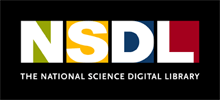
The United States' National Science Digital Library (NSDL) is an open-access online digital library and collaborative network of disciplinary and grade-level focused education providers operated by the Institute for the Study of Knowledge Management in Education. NSDL's mission is to provide quality digital learning collections to the science, technology, engineering, and mathematics (STEM) education community, both formal and informal, institutional and individual. NSDL's collections are refined by a network of STEM educational and disciplinary professionals. Their work is based on user data, disciplinary knowledge, and participation in the evolution of digital resources as major elements of effective STEM learning.

Problem-based learning (PBL) is a student-centered pedagogy in which students learn about a subject through the experience of solving an open-ended problem found in trigger material. The PBL process does not focus on problem solving with a defined solution, but it allows for the development of other desirable skills and attributes. This includes knowledge acquisition, enhanced group collaboration and communication.
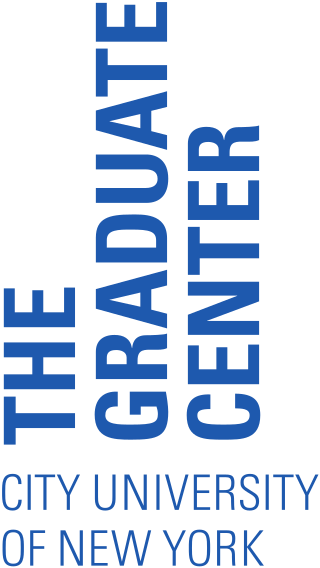
The Graduate School and University Center of the City University of New York is a public research institution and post-graduate university in New York City. Serving as the principal doctorate-granting institution of the City University of New York (CUNY) system, The CUNY Graduate Center is classified among "R1: Doctoral Universities – Very High Research Activity". The school is situated in the landmark B. Altman and Company Building at 365 Fifth Avenue in Midtown Manhattan, opposite the Empire State Building. The CUNY Graduate Center has 4,600 students, 31 doctoral programs, 14 master's programs, and 30 research centers and institutes. A core faculty of approximately 140 is supplemented by over 1,800 additional faculty members drawn from throughout CUNY's eleven senior colleges and New York City's cultural and scientific institutions.
The Open University of Israel is a distance-education university in Israel. It is one of ten public universities in Israel recognized by the Council of Higher Education (CHE). The Open University is unique in that it does not require a matriculation certificate, psychometric exam, or other entrance exam for admission to undergraduate studies.
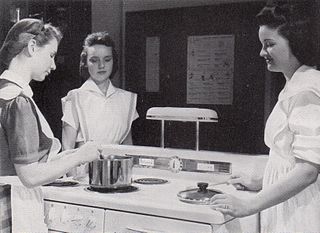
Experiential learning (ExL) is the process of learning through experience, and is more narrowly defined as "learning through reflection on doing". Hands-on learning can be a form of experiential learning, but does not necessarily involve students reflecting on their product. Experiential learning is distinct from rote or didactic learning, in which the learner plays a comparatively passive role. It is related to, but not synonymous with, other forms of active learning such as action learning, adventure learning, free-choice learning, cooperative learning, service-learning, and situated learning.
A didactic method is a teaching method that follows a consistent scientific approach or educational style to present information to students. The didactic method of instruction is often contrasted with dialectics and the Socratic method; the term can also be used to refer to a specific didactic method, as for instance constructivist didactics.

York College is a public senior college in Jamaica, Queens, New York City. It is a senior college in the City University of New York (CUNY) system. Founded in 1966, York was the first senior college founded under the newly formed CUNY system, which united several previously independent public colleges into a single public university system in 1961. The college is a member-school of Thurgood Marshall College Fund. The college enrolls more than 8,000 students. 35% of undergraduate students graduate within six years.

Open educational resources (OER) are teaching, learning, and research materials intentionally created and licensed to be free for the end user to own, share, and in most cases, modify. The term "OER" describes publicly accessible materials and resources for any user to use, re-mix, improve, and redistribute under some licenses. These are designed to reduce accessibility barriers by implementing best practices in teaching and to be adapted for local unique contexts.
Technological literacy is the ability to use, manage, understand, and assess technology. Technological literacy is related to digital literacy in that when an individual is proficient in using computers and other digital devices to access the Internet, digital literacy gives them the ability to use the Internet to discover, review, evaluate, create, and use information via various digital platforms, such as web browsers, databases, online journals, magazines, newspapers, blogs, and social media sites.

Chemistry education is the study of teaching and learning chemistry. It is one subset of STEM education or discipline-based education research (DBER). Topics in chemistry education include understanding how students learn chemistry and determining the most efficient methods to teach chemistry. There is a constant need to improve chemistry curricula and learning outcomes based on findings of chemistry education research (CER). Chemistry education can be improved by changing teaching methods and providing appropriate training to chemistry instructors, within many modes, including classroom lectures, demonstrations, and laboratory activities.
Susan B. Millar is a senior scientist at the Wisconsin Center for Education Research (WCER) at the University of Wisconsin–Madison.
Scientific literacy or science literacy encompasses written, numerical, and digital literacy as they pertain to understanding science, its methodology, observations, and theories. Scientific literacy is chiefly concerned with an understanding of the scientific method, units and methods of measurement, empiricism and understanding of statistics in particular correlations and qualitative versus quantitative observations and aggregate statistics, as well as a basic understanding of core scientific fields, such as physics, chemistry, biology, ecology, geology and computation.
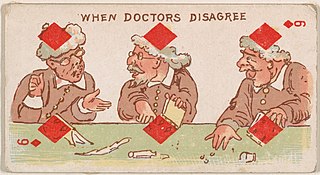
Controversies involving science exists in all aspects. Sometimes defined as a "persistent disagreement" over knowledge, the contrasting opinions of certain topics leaves individuals in a tense setting.
Process Oriented Guided Inquiry Learning (POGIL)is an activity-based, group-learning instructional strategy. The main objective of POGIL is to help the students to master the discipline, content, and develop essential learning skills simultaneously.
Statistics education is the practice of teaching and learning of statistics, along with the associated scholarly research.
Engineering education research is the field of inquiry that creates knowledge which aims to define, inform, and improve the education of engineers. It achieves this through research on topics such as: epistemology, policy, assessment, pedagogy, diversity, amongst others, as they pertain to engineering.
MERLOT is an online repository and international consortium of institutions of higher education, industry partners, professional organizations and individuals. MERLOT partners and members are devoted to identifying, peer reviewing, organizing and making available existing online learning resources in a range of academic disciplines for use by higher education faculty and students.
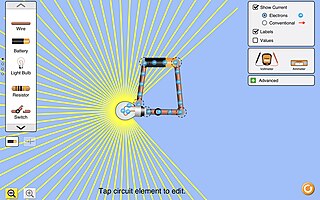
PhET Interactive Simulations, a project at the University of Colorado Boulder, is a non-profit open educational resource project that creates and hosts explorable explanations. It was founded in 2002 by Nobel Laureate Carl Wieman. PhET began with Wieman's vision to improve the way science is taught and learned. Their stated mission is "To advance science and math literacy and education worldwide through free interactive simulations."









